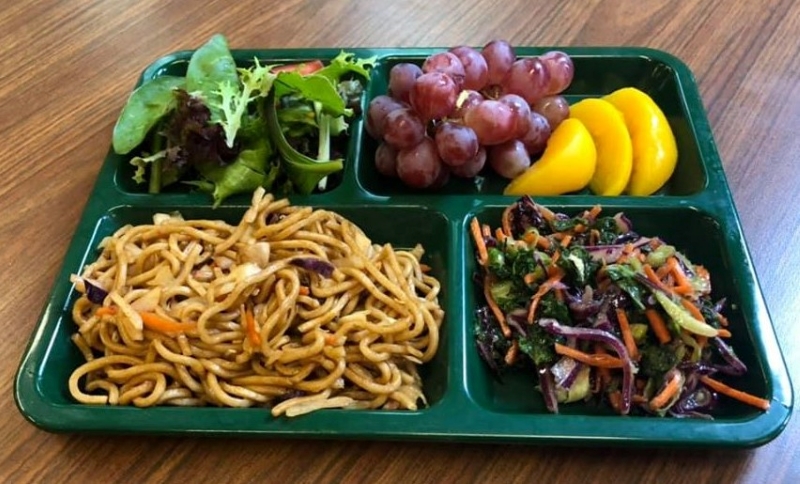-
PPS’s Yakisoba noodles lunch recognized as one of nation’s best school meals
11/19/2019A meal that started as a cultural celebration at one of Portland Public Schools’ dual language immersion schools has now gained national recognition as one of the best meals served at a K-12 school in the United States.
Food Management, a news organization dedicated to noncommercial food service, has named PPS’s yakisoba noodles the nation’s top school meal in the pasta category. The lunch, which was served district-wide in May, features locally-made noodles with chicken and shredded cabbage in a yakisoba sauce, alongside fruits and vegetables.
“We feel this is a great example of two of our values—community partnerships and local purchasing,” PPS’s Nutrition Services wrote in the meal description.
Nutrition Services, which sets PPS’s district-wide meal menu, uses locally sourced ingredients when feasible, taking advantage of Oregon’s Farm to School Grant. The yakisoba meal is anchored by noodles from a local company, Umi Organic. It started as part of a cultural lunch at Richmond Elementary School, which holds annual or twice-a-year Japanese lunches. Richmond is the district’s Japanese immersion school, where students learn in both English and Japanese.
The lunches, which started in 2015, included such Japanese meals as a curry dish with chicken and vegetables over rice. The yakisoba was a student favorite, and Nutrition Services wanted to add the meal to its Local Lunch Days program that features a monthly meal made with local ingredients.
“We found how popular it was, and how successful it was in our kitchens and operations, that we decided to try and make it happen district-wide,” said Whitney Ellersick, Senior Director of Nutrition Services.
Before yakisoba was added to the rotation, PPS had to find a noodle that would comply with the United States Department of Agriculture’s nutritional guidelines, a requirement because the USDA funds school meals in PPS. That meant the noodles had to be 50% grain rich.
Umi CEO Lola Milholland and her staff took on the challenge, and after plenty of trial and error, they found the magic formula in a combination of Durum and Edison wheat from Camas Country Mill in Junction City. Because PPS kitchens primarily cook with ovens, the noodles had to be able to withstand that heat, and Umi found a combination of boiling and chilling in making the noodles that allowed them to be prepared in an oven on lunch day.
For Milholland, having her noodles served in PPS brought her full circle. She attended Richmond, part of the second group of Japanese immersion classes.
By Month
- June 2025
- May 2025
- March 2025
- February 2025
- January 2025
- October 2024
- September 2024
- June 2024
- May 2024
- April 2024
- March 2024
- February 2024
- January 2024
- December 2023
- November 2023
- October 2023
- September 2023
- August 2023
- June 2023
- May 2023
- January 2023
- December 2022
- November 2022
- October 2022
- September 2022
- August 2022
- July 2022
- June 2022
- May 2022
- April 2022
- March 2022
- February 2022
- January 2022
- December 2021
- November 2021
- October 2021
- September 2021
- August 2021
- July 2021
- June 2021
- May 2021
- April 2021
- March 2021
- February 2021
- January 2021
- December 2020
- October 2020
- September 2020
- August 2020
- July 2020
- June 2020
- May 2020
- April 2020
- March 2020
- February 2020
- January 2020
- December 2019
- November 2019
- October 2019
- September 2019
- August 2019
- June 2019
- May 2019
- April 2019
- March 2019
- February 2019
- January 2019
- December 2018
- November 2018
- October 2018
- September 2018
- August 2018
- July 2018
- June 2018
- May 2018
- April 2018
- March 2018
- February 2018
- January 2018
- December 2017
- November 2017
- October 2017
- September 2017
- August 2017
- July 2017
- June 2017
- May 2017
- April 2017
- March 2017
- February 2017
- January 2017
- December 2016
- November 2016
- October 2016
- September 2016
- August 2016
- July 2016
- June 2016
- May 2016
- April 2016
- March 2016
- February 2016
- January 2016
- December 2015
- June 2015



